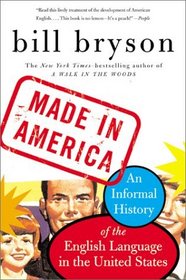Helpful Score: 4
This is a history of the English (as spoke in America) language. It was in many ways tough to get through. Sections were fascinating, then there was a paragraph of a list of words and nothing else. Then it was slow. It was just hard to read more than a little bit at a time, and some parts requird slogging. But the good parts were worth fighting through the rest of the book.
I wish he'd had fewer word lists and more information on words. For example "boss" came from the Danes, but that's all he notes. It was adopted into English because ex-slaves didn't want to use "master", and they heard sailors on the docs (who were Danish) calling their headmen "boss". Which means master in Danish, but was a different word than master, and thus fulfilled the need.
The romps through history were interesting, as was the comment that while spelling varied, that didn't mean writers in general (such as the Declaration of Indpendence writers) didn't care about the spelling. It was also interesting the English view of America and American English. That was a fun section.
In fact, there was no large swath I can say wasn't good, there was just some bog in amongst the dry ground. Overall, I think I prefer his Short History of Everything, and am glad I read that first or I might not have.
A book best taken a chapter at a time over time.
I wish he'd had fewer word lists and more information on words. For example "boss" came from the Danes, but that's all he notes. It was adopted into English because ex-slaves didn't want to use "master", and they heard sailors on the docs (who were Danish) calling their headmen "boss". Which means master in Danish, but was a different word than master, and thus fulfilled the need.
The romps through history were interesting, as was the comment that while spelling varied, that didn't mean writers in general (such as the Declaration of Indpendence writers) didn't care about the spelling. It was also interesting the English view of America and American English. That was a fun section.
In fact, there was no large swath I can say wasn't good, there was just some bog in amongst the dry ground. Overall, I think I prefer his Short History of Everything, and am glad I read that first or I might not have.
A book best taken a chapter at a time over time.
With Bryson's typical wit, he embarks upon a delightful history of English in America. Believe or not, this Queen of Trivia actually learnt something reading this book. A bit more scholarly than his travelogues, it's still a good read nonetheless. If you liked his "Mother Tongue" you'll probably like this book.
Helpful Score: 2
A quick read. Full of the origins of various American idioms and expressions. Laugh out loud in places, a bit heavy on trivia in others. Overall not a bad introduction to the etymology of Americanisms, past and present.
Not my favorite Bryson book...but still if you like Bryson you will like this book.
I LOVE Bill Bryson, and have read many of his books, but this one just did not catch my attention. First, the print was very small and hard for "old eyes" to read. Second, he tells about allot of different things other than how America got it's words, and that was interesting. But he also talks about how this word or that word or words were pronounced and I could just not get into it. I gave it a week, to see if it was going to get better, but alas it didn't. I think, for me, the print being so small, making each page even longer was the worst part. If you love Bill, you might want to give this one a try though. It may be your "cup of tea".




